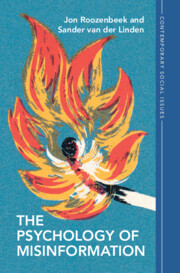Book contents
- The Psychology of Misinformation
- Contemporary Social Issues
- The Psychology of Misinformation
- Copyright page
- Contents
- Figures
- Acknowledgments
- Prologue
- Part I Setting the Stage
- Part II Misinformation Belief and Spread
- Part III Countering Misinformation
- 6 Laws and Regulation
- 7 Interventions to Combat Misinformation
- 8 Reflecting on Our Own Program of Research
- References
- Index
7 - Interventions to Combat Misinformation
from Part III - Countering Misinformation
Published online by Cambridge University Press: 28 March 2024
- The Psychology of Misinformation
- Contemporary Social Issues
- The Psychology of Misinformation
- Copyright page
- Contents
- Figures
- Acknowledgments
- Prologue
- Part I Setting the Stage
- Part II Misinformation Belief and Spread
- Part III Countering Misinformation
- 6 Laws and Regulation
- 7 Interventions to Combat Misinformation
- 8 Reflecting on Our Own Program of Research
- References
- Index
Summary
This chapter reviews the evidence behind the anti-misinformation interventions that have been designed and tested since misinformation research exploded in popularity around 2016. It focuses on four types of intervention: boosting skills or competences (media/digital literacy, critical thinking, and prebunking); nudging people by making changes to social media platforms’ choice architecture; debunking misinformation through fact-checking; and (automated) content labelling. These interventions have one of three goals: to improve relevant skills such as spotting manipulation techniques, source criticism, or lateral reading (in the case of boosting interventions and some content labels); to change people’s behavior, most commonly improving the quality of their sharing decisions (for nudges and most content labels); or to reduce misperceptions and misbeliefs (in the case of debunking). While many such interventions have been shown to work well in lab studies, there continues to be an evidence gap with respect to their effectiveness over time, and how well they work in real-life settings (such as on social media).
- Type
- Chapter
- Information
- The Psychology of Misinformation , pp. 98 - 115Publisher: Cambridge University PressPrint publication year: 2024

